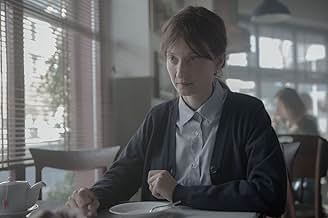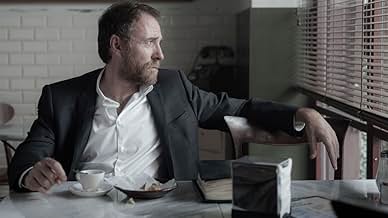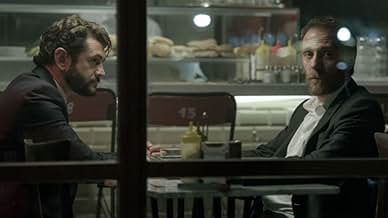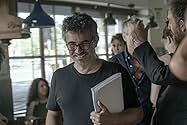AVALIAÇÃO DA IMDb
7,0/10
13 mil
SUA AVALIAÇÃO
Adicionar um enredo no seu idiomaThe fates of an apparently random group of strangers who each come into contact with a mysterious figure who they believe possesses the power to grant any wish, in return for which they must... Ler tudoThe fates of an apparently random group of strangers who each come into contact with a mysterious figure who they believe possesses the power to grant any wish, in return for which they must carry out a task he assigns them.The fates of an apparently random group of strangers who each come into contact with a mysterious figure who they believe possesses the power to grant any wish, in return for which they must carry out a task he assigns them.
- Direção
- Roteiristas
- Artistas
- Prêmios
- 1 vitória e 17 indicações no total
- Direção
- Roteiristas
- Elenco e equipe completos
- Produção, bilheteria e muito mais no IMDbPro
Avaliações em destaque
I kind of enjoyed The Place even though it has lots of flaws. The acting and dialogue was spot on and the story had enough twists to keep me interested until the end.
The film did however have lots of problems for me. First of all the editing and cinematophy were really dull and I had a very hard time finding a motivation behind certain choices that were made. The soundtrack also didnt work for me at all. The music was very uninteresting and generic, it would probably have worked better with no music at all, or at least with some restraint. The horrible music at the end left me running away from the theatre.
In conclusion: director Paulo Genovese is good at directing his actors and keeping a story interesting like in his previous film Perfect Strangers, but the style of the film was very poor and undermined the potential of the story greatly.
In conclusion: director Paulo Genovese is good at directing his actors and keeping a story interesting like in his previous film Perfect Strangers, but the style of the film was very poor and undermined the potential of the story greatly.
The film keeps you engaged from the start, and leaves plenty to think about when it's over. And yet it is neither preachy nor pretentious. It starts off as a film about the things people would be prepared to do in order to achieve their dreams, but it moves on to other themes, such as what you think you need vs. what you really need, being able to live with oneself having achieved something through trickery and evil deeds, or good outcomes eventually arising from people's intentions to actually do bad things. The film does not involve action, it is based around dialogue. But rest assured, it will never bore you, and it will keep introducing twists that will keep you engaged and constantly guessing what will happen next.
Not since My Dinner with Andre can I recall a film set in a single location - now we have this 2017 Italian film The Place, a cafe by that name in which a distinguished-looking fiftyish man holds court at a back table. Supplicants come to him with the problems that most deeply disturb them, and he flips through his thick handwritten notebook to one of the red ribbons - the kind you'd see in a Bible to mark a verse - and tells them what act will bring about what they want.
These acts have nothing to do with their problems - a woman who wants to be prettier is told to steal a very specific amount; a blind man is told that raping a woman will give him sight. But once he pronounces an oracular "deal" he has no alternate solution. They are free not to accept it, or to follow through, but each of them wants their outcome strongly enough to make their pact - at least to begin with.
They stop by to report on their progress, which he records in his notebook. The tasks he assigns often overlap, either by his design or by some hand of providence, and some people get what they ask for, some change their minds and drop the whole thing, and some try to convince him they did as he said - but he tells them they didn't. "How do you know?" A man of few words, he doesn't answer, but we know that they didn't. If they had, something about them would be different.
He is an enigma - we learn the names of some characters, but even in the credits he is Uomo (the Man). He's at The Place when they're setting up in the morning, he's there when the waitress is mopping up at night. As she probes, he admits he doesn't sleep much. We don't see him arrive, we don't see him leave. Sometimes The Place is crowded, other times he's the only customer, and the chairs are upside down on every table except his. Why doesn't he get kicked out? What's his source of funds? He eats and drinks all day, but we never see him pay.
For a man intent on details, he offers few of his own. His supplicants ask him questions, including "Who are you?" which he deflects, returning to why they have come. One character accuses him of being Satan, which he neither confirms nor denies. He displays a lordly indifference to what they think of him - his only concern, once he's assigned their task, is what steps they're taking to complete it.
Is his purpose to awaken conscience, or to demonstrate to people that their desires blot out their morality? Or is he an evil being with the power to grant people's wishes - as long as he gets in trade their compromised integrity? Or is he simply a mirror of a self-absorbed culture in which our happiness is so important we're willing to destroy someone else's to get it?
These acts have nothing to do with their problems - a woman who wants to be prettier is told to steal a very specific amount; a blind man is told that raping a woman will give him sight. But once he pronounces an oracular "deal" he has no alternate solution. They are free not to accept it, or to follow through, but each of them wants their outcome strongly enough to make their pact - at least to begin with.
They stop by to report on their progress, which he records in his notebook. The tasks he assigns often overlap, either by his design or by some hand of providence, and some people get what they ask for, some change their minds and drop the whole thing, and some try to convince him they did as he said - but he tells them they didn't. "How do you know?" A man of few words, he doesn't answer, but we know that they didn't. If they had, something about them would be different.
He is an enigma - we learn the names of some characters, but even in the credits he is Uomo (the Man). He's at The Place when they're setting up in the morning, he's there when the waitress is mopping up at night. As she probes, he admits he doesn't sleep much. We don't see him arrive, we don't see him leave. Sometimes The Place is crowded, other times he's the only customer, and the chairs are upside down on every table except his. Why doesn't he get kicked out? What's his source of funds? He eats and drinks all day, but we never see him pay.
For a man intent on details, he offers few of his own. His supplicants ask him questions, including "Who are you?" which he deflects, returning to why they have come. One character accuses him of being Satan, which he neither confirms nor denies. He displays a lordly indifference to what they think of him - his only concern, once he's assigned their task, is what steps they're taking to complete it.
Is his purpose to awaken conscience, or to demonstrate to people that their desires blot out their morality? Or is he an evil being with the power to grant people's wishes - as long as he gets in trade their compromised integrity? Or is he simply a mirror of a self-absorbed culture in which our happiness is so important we're willing to destroy someone else's to get it?
General impression: The movie starts in one place and ends with the very same place. The movie doesn't take us anywhere. Everything happens here and now. But despite the fact that there are no changing locations or special effects, I didn't take my eyes off the screen for a single minute, I was so immersed in the fascinating and interactive process. We are introduced to a man who sits in a cafe all the time, doesn't go anywhere, but people come to him and ask him to fulfill their desires, it could be anything: pregnancy, love, money, women, etc. But the stranger is not ready to just fulfill any coming request. To make their wish come true, each of the guests is asked to perform unusual tasks. The more difficult it is to fulfill this dream, the higher the price. Each of the heroes must make their own choice - how far are they willing to go in order to get what they want.
How far will you go to get the things you desire? Is there any limit at all?
Another creative writing from Paolo Genovese, the director of Perfect Strangers (Post #38 on Zoetrope360, Instagram). This movie is thought provoking as it explores the dark side of us, what are we willing to do to get the things we want.
The entire movie happens within a cafe, The Place. It's like reading a book, you visualize the things happening outside based on what people interact in the cafe.
Another creative writing from Paolo Genovese, the director of Perfect Strangers (Post #38 on Zoetrope360, Instagram). This movie is thought provoking as it explores the dark side of us, what are we willing to do to get the things we want.
The entire movie happens within a cafe, The Place. It's like reading a book, you visualize the things happening outside based on what people interact in the cafe.
Você sabia?
- CuriosidadesShot in 13 days.
- ConexõesRemake of The Booth at the End (2011)
Principais escolhas
Faça login para avaliar e ver a lista de recomendações personalizadas
- How long is The Place?Fornecido pela Alexa
Detalhes
- Data de lançamento
- País de origem
- Central de atendimento oficial
- Idioma
- Também conhecido como
- The Place
- Empresas de produção
- Consulte mais créditos da empresa na IMDbPro
Bilheteria
- Faturamento bruto mundial
- US$ 5.784.397
- Tempo de duração1 hora 45 minutos
- Cor
- Proporção
- 2.35 : 1
Contribua para esta página
Sugerir uma alteração ou adicionar conteúdo ausente


![Assistir a Trailer [OV]](https://m.media-amazon.com/images/M/MV5BMGYwOGJlOTUtNjI2Yi00YjE4LTk2MjItMzFiMmIzOGJjMzNjXkEyXkFqcGdeQXRodW1ibmFpbC1pbml0aWFsaXplcg@@._V1_QL75_UX500_CR0)
![Trailer [OV]](https://m.media-amazon.com/images/M/MV5BODk1NGI5OGMtZDQ0My00MjhlLTgxODctZmJlZjVhMWU5YWEyXkEyXkFqcGdeQXRodW1ibmFpbC1pbml0aWFsaXplcg@@._V1_QL75_UX500_CR0)






























